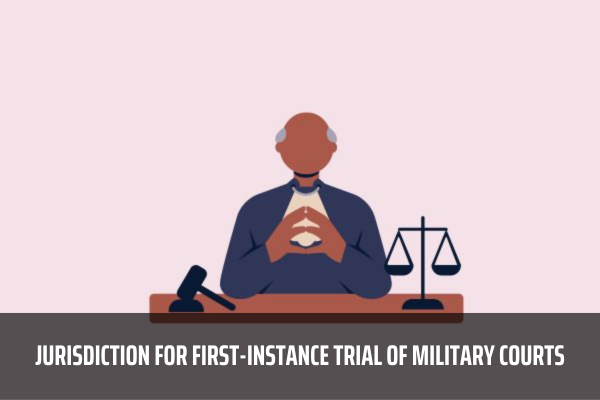What is the jurisdiction for first-instance trial of military courts in Vietnam under the Circular 03/2023/TT-TANDTC?
What is the jurisdiction for first-instance trial of military courts in Vietnam under the Circular 03/2023/TT-TANDTC?
Based on the provisions in Article 6 of Circular 03/2023/TT-TANDTC, the jurisdiction for first-instance trial of military courts is guided as follows:
(1) Regional military courts have jurisdiction to handle first-instance trials of criminal cases involving offenses specified in Article 268, Clause 1 of the Criminal Procedure Code 2015, in which the accused or the person subject to prosecution holds a military rank from Captain down or holds the highest military rank of Captain.
(2) Military district courts and equivalent military courts have jurisdiction to handle first-instance trials of criminal cases:
- Crimes that are not under the jurisdiction of regional military courts.
- Cases involving defendants, victims, or parties residing abroad or assets related to foreign cases.
Defendants, victims, parties residing abroad, or assets related to foreign cases are determined as follows:
+ Defendants, victims, or parties residing abroad are foreigners who are residents, non-residents, doing business, studying, working in Vietnam but not present in Vietnam at the time when the competent authority handles the case.
+ Defendants, victims, or parties are Vietnamese citizens who are residents, doing business, studying, working abroad but not present in Vietnam at the time when the competent authority handles the case.
+ Defendants, victims, or parties are Vietnamese citizens who are residents, doing business, studying, working in Vietnam but currently staying abroad at the time when the competent authority handles the case.
+ Organizations, institutions, regardless of whether they are foreign or Vietnamese entities, that do not have headquarters, branches, or representative offices in Vietnam at the time when the competent authority handles the case.
+ Assets abroad are assets determined according to the provisions of the Civil Code outside the territory of the Socialist Republic of Vietnam at the time when the competent authority handles the case.
+ Crimes in which the accused or the person subject to prosecution holds a military rank from Major up or holds the highest military rank from Major up.
+ Crimes falling under the jurisdiction of regional military courts but involving complex and difficult-to-evaluate circumstances, uniformity in the nature of the case, or involving multiple levels and sectors; cases in which the defendant is a Judge, Prosecutor, Investigator, key leader at the district level, or a person with high prestige in religion or ethnic minority.
In addition, the provisions on ranks in Article 6, Clause 1, and Point c, Clause 2 of Circular 03/2023/TT-TANDTC are determined according to the provisions of the laws on the People's Army Officer, related laws, and regulations of the Ministry of National Defense.
The provisions on military ranks in Clause 1 and Point c, Clause 2 of Circular 03/2023/TT-TANDTC include ranks of officers, non-commissioned officers, soldiers, and ranks of professional military personnel.

What is the jurisdiction for first-instance trial of military courts in Vietnam under the Circular 03/2023/TT-TANDTC?
What is the organizational structure of Military Court of military zones in Vietnam?
Pursuant to Law on Organization of People s Courts 2014, organizational structure of military courts of military zones and the equivalent is as follows:
- The organizational structure of a military court of a military zone or the equivalent consists of:
+ The judicial committee;
+ The assisting apparatus.
- A military court of a military zone or the equivalent has its chief justice, deputy chief justices, judges, examiners, court clerks, other civil servants and employees.
- The Chief Justice of the Supreme People’s Court shall decide on the establishment and stipulate duties and powers of the assisting apparatus of military courts of military zones and the equivalent after reaching agreement with the Minister of National Defense..
Furthermore, pursuant to Resolution 571/NQ-UBTVQH14, the organizational structure of the current military courts is as follows:
Establishment of 9 military courts of military zone and equivalent courts based on the existing military courts military zones and equivalent courts:
- Military Court of Military Zone 1;
- Military Court of Military Zone 2;
- Military Court of Military Zone 3;
- Military Court of Military Zone 4;
- Military Court of Military Zone 5;
- Military Court of Military Zone 7;
- Military Court of Military Zone 9;
- Military Court of Hanoi Capital;
- Military Court of the Navy.
What are the judicial committees of military courts of military zones in Vietnam?
Pursuant to Article 57 of Law on Organization of People s Courts 2014, the judicial committees of military courts of military zones and the equivalent are as follows:
- The judicial committee of a military court of a military zone or the equivalent shall be composed of the chief justice, deputy chief justices and a number of judges. The number of member of the judicial committee shall be decided by the Chief Justice of the Supreme People’s Court at the proposal of the chief justice of the military court.
Meetings of the judicial committee of a military court of a military zone or the equivalent shall be chaired by the chief justice.
- The judicial committee of a military court of a military zone or the equivalent has the following duties and powers:
+ To discuss the implementation of work programs and plans of its military court;
+ To discuss work reports of the chief justice of its military court to the Supreme People’s Court and the Ministry of National Defense;
+ To summarize adjudication experience;
+ To discuss recommendations of the chief justice of its military court for the Chief Justice of the Central Military Court to review legally effective judgments and decisions according to cassation or reopening procedure.
Circular 03/2023/TT-TANDTC comes into force from February 15, 2024.
LawNet
